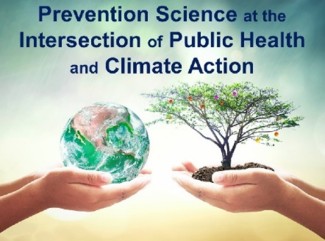Prevention Science and Climate Action: Charting a course of involvement

On May 26, the Society for Prevention Research (SPR) International Committee will hold a session on "Prevention Science and Climate Action: Charting a course of involvement".
May 26, 2021 at 3:00 – 4:00 pm, Eastern Time (EDT)
The UN Sustainable Development Goals (SDGs) represent a global consensus on transitioning to a sustainable world environment that will promote the health and well-being of people around the world. Four of the 17 sustainable goals outlined to support and sustain a globally healthy environment are particularly important for prevention researchers and specialists to address: #3 Good Health and Well-being, #4 Quality Education, #13 Climate Action, and #17 Partnerships for the Goals.
Prevention researchers and specialists are well-positioned to support this global effort. Lu and colleagues (2015) suggest focusing on five priorities: 1) Devise metrics that will be practical indices for tracking progress for each of the SDGs; 2) Establish monitoring mechanisms on behaviors, values, and beliefs related to SDGs; 3) Evaluate progress regarding performance and implementation of SDGs; 4) Enhance infrastructure for monitoring and information-processing capacities globally; and 5) Standardize and verify data.
During this International Forum Discussion, three approaches widely incorporated in prevention science will be presented as frameworks for engaging and collaborating on these SDGs and global efforts that address the intersection of climate action and public health: 1) Healthy youth development (individual and family-level important in the context of climate action); 2) Community-based approaches (community participatory models); and 3) Policy. The session will open with three “Ted-like talks” that focus on policy discussion using a public health lens, theories of behavior change, and systems science to address the interconnectedness of policy development with the psychological and sociological aspects of climate change.
Responses from invited youth and early career prevention specialists will provide ideas about creative efforts, mobilizing and inclusion of “next generation” voices, and perspectives that will energize inspire our future actions. The audience will be asked to respond to presentations and responses, reflecting upon next steps to create active engagement in addressing climate action in our respective work, thereby contributing to the UN SDGs. Members from three international Prevention Science organizations are committed to working together to build working collaborative groups that will continue to develop initiatives relevant to addressing climate change as part of our ongoing work: the U.S. Society for Prevention Research (SPR), the European Society for Prevention Research (EUSPR), and the Brazilian Association for Research on Prevention and Health Promotion (BRAPEP). Following this session, three regional workshop sessions will be held, to allow actions and collaborations to facilitate effective change.
REGISTRATION IS FREE, but attendees must register for the International Networking Forum and/or a specific breakout session(s). Links to the breakout sessions are listed below each Regional breakout session. After you register you will receive a confirmation email containing information about joining the meeting.
Registration for International Networking Forum: https://us02web.zoom.us/meeting/register/tZIpduurqD8pHdZW1lIaNNddxF0RdNLNNXhH
May 26, 2021 at 3:00 – 4:00 pm, Eastern Time (EDT), US
Time conversions:
Central Europe: May 26, 2021 / 9:00 – 10 pm (CEST)
Australia & Asia: May 27, 2021 / 5:00 – 6:00 am (AEST)
Presenters:
Chair of the International Networking Forum Session: Brenda A. Miller, Ph.D.
- John Toumbourou, Ph.D., Professor and Chair, Health Psychology, Deakin University Faculty of Health
- William Wieczorek, Ph.D., CEO & President of Pacific Institute for Research & Evaluation, Professor Emeritus, School of Natural and Social Sciences, State University of New York College at Buffalo (SUNY Buffalo State)
- Rebecca Boulos, Ph.D., M.P.H., Executive Director, Maine Public Health Association and Co-chair, Maine Climate Council Community Resilience Planning, Public Health, and Emergency Management Working Group.
PLEASE JOIN US FOR FOLLOW UP BREAKOUT SESSIONS
Three World-wide Regional Workgroups are scheduled to follow the International Networking Forum to allow for discussion and developing recommendations for action plans for the International Committee of SPR, EUSPR, and BRAPEP. Participants are invited to attend breakouts but must register for a specific breakout session.
Registration for Australian and Asian breakout session:
May 27, 2021 at 9:00 – 10:00 am (AEST)
TIME CONVERSIONS
|
Washington, DC, USA |
May 26, 2021 |
7:00 – 8:00 pm (EDT) |
|
Central Europe |
May 27, 2021 |
1:00 – 2:00 am (CEST) |
Registration is free but required, register here:
https://deakin.zoom.us/meeting/register/tZcpcuqprjIoEtwLK4cy_lLucdGUwOVlmJXr
Registration for Central Europe & Africa break out session:
May 27, 2021 at 10:00 – 11:00 am (CEST)
TIME CONVERSIONS
|
Washington, DC, USA |
May 27, 2021 |
4:00 – 5:00 am (EDT) |
|
Australia & Asia |
May 27, 2021 |
6:00 – 7:00 pm (AEST) |
Registration is free but required, register here: https://us02web.zoom.us/meeting/register/tZwoceyvqjIqHtSAWNkf5P3CfYooIsqj7jgL
Registration for Americas break out session:
May 27, 2021 at 1:00 – 2:00 pm (EDT)
TIME CONVERSIONS
|
Central Europe |
May 27, 2021 |
7:00 – 8:00 pm (CEST) |
|
Australia & Asia |
May 28, 2021 |
3:00 – 4:00 am (AEST) |
Registration is free but required, register here:
https://us02web.zoom.us/meeting/register/tZAvc-CprD8uGNDMuUD6lq8shgPv4bXMpB6b